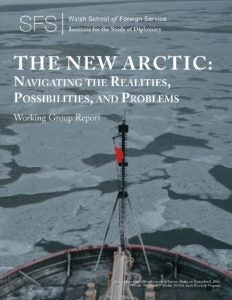Read the report
The rapidly changing Arctic will have profound environmental, social, cultural, economic, and geopolitical effects that extend well beyond the region. Warmer temperatures and melting ice create rising seas and increasingly strong and unpredictable storms around the globe, and pose new ecological risks to local livelihoods. Less ice for longer periods each year brings the promise of new transportation routes and access to natural resources, but the opportunities do not come without challenges. This will mean more traffic in a region lacking infrastructure, environmental safety measures, and widespread search and rescue capabilities. And there may be new security challenges from Arctic as well as non-Arctic states. To explore all of these Arctic issues and discuss the geopolitical repercussions of the changes to the region, in late 2017 the Institute for the Study of Diplomacy convened a working group on “The New Arctic: Navigating the Realities, Possibilities, and Problems.”
Experts on the Arctic, climate change, and security policy joined senior policymakers, practitioners, and academics to explore the nexus between the New Arctic and geopolitics, focusing on what individual nations, regional bodies, and the international community need to do now to prepare for a new normal in the Far North. The ISD working group produced a set of principles and recommendations for policymakers, non-governmental organizations, academic institutions, and regional and international bodies to incorporate into their near-term planning. The overarching goal, ISD believes, is to preserve the Arctic’s de-politicized and demilitarized status while balancing economic benefits and environmental integrity, in concert with the needs and views of the local communities.
